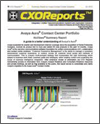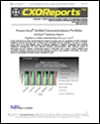August 03, 2007
Study Reveals Telecommunications Potential in Hungarian Market
 By Susan J. Campbell, TMCnet Contributing Editor
By Susan J. Campbell, TMCnet Contributing Editor
Here in the U.S. we expect to have a great deal of technology to be readily available at our fingertips. Our telecommunication systems have long been in place, for example, and we are accustomed to the idea that we’ll have 100 percent service availability 100 percent of the time. Technology has even taken us to the point that we are now fully dependent upon our cell phones and PDAs to keep us connected and on task.
Not every country or region has enjoyed the same telecommunication luxuries that we have here in the States. The telecommunication services market in Hungary just a few short years ago claimed a lack of necessities for basic operations. Now, the market there has changed into a competitive environment with Western standards.
The reshaping of the partially monopolistic market structures are contributed to by foreign investments into a limited number of fixed and mobile service providers. For potential new market participants, the Hungarian telecommunications market overall has been considered a “Closed Shop” to date. Competition is expected to increase considerably in the future.
Such analysis is the result of a recent study from goetzpartners and Consolidus. Fixed, mobile and cable service providers are forced to extend their activities beyond their traditional markets as they have experience stagnating or even falling penetration rates and continuous deregulation. These providers are entering new markets with convergence and substitution products and have been further intensifying competition in these new segments.
Euro Hungary can claim 10.1 million inhabitants and a gross domestic product of 88.9 billion. The country also ranks among the larger Eastern European markets. In the course of the political reorientation of the country the Hungarian telecommunications market has been subject to a gradual liberalization and Magyar Telekom (former Matáv Hungarian Telecommunications Company) has been privatized.
Numerous international investors have been attracted to the area as a result of the liberalization, including Deutsche Telekom (News - Alert), Telenor, Vodafone, Tele Danmark and UPC. However, prior to entry to the European Union in May 2004, the Hungarian telecommunications market was less open and it became more dynamic in the past three years.
Today penetration and service standards have achieved a Western European level with Hungarian households spending 3.8 percent of their income on telecommunications services.
Competition is still basically limited to three to four major players in the various market segments, however. Magyar Telekom, the largest provider among them, has grabbed market shares of 79 percent in the fixed line, 44 percent in the mobile, 19 percent in the cable and 43 percent in the Internet sector.
Not every country or region has enjoyed the same telecommunication luxuries that we have here in the States. The telecommunication services market in Hungary just a few short years ago claimed a lack of necessities for basic operations. Now, the market there has changed into a competitive environment with Western standards.
The reshaping of the partially monopolistic market structures are contributed to by foreign investments into a limited number of fixed and mobile service providers. For potential new market participants, the Hungarian telecommunications market overall has been considered a “Closed Shop” to date. Competition is expected to increase considerably in the future.
Such analysis is the result of a recent study from goetzpartners and Consolidus. Fixed, mobile and cable service providers are forced to extend their activities beyond their traditional markets as they have experience stagnating or even falling penetration rates and continuous deregulation. These providers are entering new markets with convergence and substitution products and have been further intensifying competition in these new segments.
Euro Hungary can claim 10.1 million inhabitants and a gross domestic product of 88.9 billion. The country also ranks among the larger Eastern European markets. In the course of the political reorientation of the country the Hungarian telecommunications market has been subject to a gradual liberalization and Magyar Telekom (former Matáv Hungarian Telecommunications Company) has been privatized.
Numerous international investors have been attracted to the area as a result of the liberalization, including Deutsche Telekom (News - Alert), Telenor, Vodafone, Tele Danmark and UPC. However, prior to entry to the European Union in May 2004, the Hungarian telecommunications market was less open and it became more dynamic in the past three years.
Today penetration and service standards have achieved a Western European level with Hungarian households spending 3.8 percent of their income on telecommunications services.
Competition is still basically limited to three to four major players in the various market segments, however. Magyar Telekom, the largest provider among them, has grabbed market shares of 79 percent in the fixed line, 44 percent in the mobile, 19 percent in the cable and 43 percent in the Internet sector.
Competition in the future is expected to intensify. The study reveals that the fixed line market will decrease, the mobile market is moving towards saturation and the growth potential for broadband Internet services is limited, due only to partial PC penetration. In this situation the players in Hungary are seeking new growth potential factors, arising in particular as a result of new Internet and mobile technologies.
"New mobile technologies will affect existing market structures considerably", says Armin Raffalski, partner at goetzpartners management Consultants, in a Friday statement. "From 2002 to 2005 the penetration rate in the fixed line area decreased by 10 percent to 87 percent. New technologies such as UMTS, EDGE and WiMAX will reinforce competition considerably, as they offer new business models for established players as well as for new entrants in the mobile market".
will reinforce competition considerably, as they offer new business models for established players as well as for new entrants in the mobile market".
Established market structures are being reshaped by new players such as Skype (News - Alert), and by new business models, including Triple Play , offered by established players such as UPC or Magyar Telekom.
, offered by established players such as UPC or Magyar Telekom.
"Magyar Telekom, the prominent incumbent in the Hungarian telecommunications market, has integrated its mobile business into the company and now offers fixed, mobile and Internet solutions from one source. This restructuring is an example for an explicitly customer-oriented approach, in contrast to the so far technologically driven approach", says Zoltán Zsoldos, Managing Director of Consolidus, in Friday’s statement.
Although the emerging market changes basically offer also potential for new entrants, goetzpartners and Consolidus assume the existing market structures will continue to further solidify. As a result, new players can only enter the field if the Hungarian regulation authority enables new business models or one of the established international incumbents exits the market.
"New mobile technologies will affect existing market structures considerably", says Armin Raffalski, partner at goetzpartners management Consultants, in a Friday statement. "From 2002 to 2005 the penetration rate in the fixed line area decreased by 10 percent to 87 percent. New technologies such as UMTS, EDGE and WiMAX
Established market structures are being reshaped by new players such as Skype (News - Alert), and by new business models, including Triple Play
"Magyar Telekom, the prominent incumbent in the Hungarian telecommunications market, has integrated its mobile business into the company and now offers fixed, mobile and Internet solutions from one source. This restructuring is an example for an explicitly customer-oriented approach, in contrast to the so far technologically driven approach", says Zoltán Zsoldos, Managing Director of Consolidus, in Friday’s statement.
Although the emerging market changes basically offer also potential for new entrants, goetzpartners and Consolidus assume the existing market structures will continue to further solidify. As a result, new players can only enter the field if the Hungarian regulation authority enables new business models or one of the established international incumbents exits the market.
Want to learn more about VoIP? Then be sure to check out TMCnet’s White Paper Library, which provides a selection of in-depth information on relevant topics affecting the IP Communications industry. The library offers white papers, case studies and other documents which are free to registered users.
Communications industry. The library offers white papers, case studies and other documents which are free to registered users.
Susan J. Campbell is a contributing editor for TMC (News - Alert) and has also written for eastbiz.com. To see more of her articles, please visit Susan J. Campbell’s columnist page.














